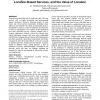Free Online Productivity Tools
i2Speak
i2Symbol
i2OCR
iTex2Img
iWeb2Print
iWeb2Shot
i2Type
iPdf2Split
iPdf2Merge
i2Bopomofo
i2Arabic
i2Style
i2Image
i2PDF
iLatex2Rtf
Sci2ools
159
click to vote
HUC
2010
Springer
2010
Springer
Exploring end user preferences for location obfuscation, location-based services, and the value of location
Long-term personal GPS data is useful for many UbiComp services such as traffic monitoring and environmental impact assessment. However, inference attacks on such traces can reveal private information including home addresses and schedules. We asked 32 participants from 12 households to collect 2 months of GPS data, and showed it to them in visualizations. We explored if they understood how their individual privacy concerns mapped onto 5 location obfuscation schemes (which they largely did), which obfuscation schemes they were most comfortable with (Mixing, Deleting data near home, and Randomizing), how they monetarily valued their location data, and if they consented to share their data publicly. 21/32 gave consent to publish their data, though most households' members shared at different levels, which indicates a lack of awareness of privacy interrelationships. Grounded in real decisions about real data, our findings highlight the potential for end-user involvement in obfuscati...
| Added | 09 Nov 2010 |
| Updated | 09 Nov 2010 |
| Type | Conference |
| Year | 2010 |
| Where | HUC |
| Authors | A. J. Bernheim Brush, John Krumm, James Scott |
Comments (0)

